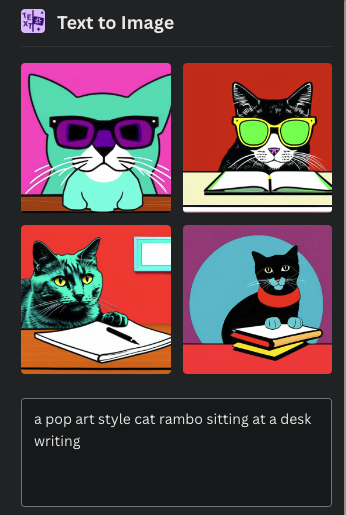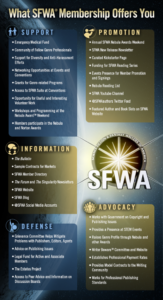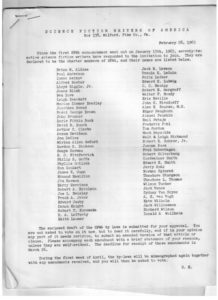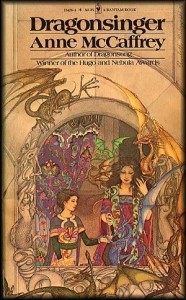 A day that I’ve been saying would arrive for about twenty years now is starting to loom on the timeline, and it’s taking a lot of smart people by surprise when it shouldn’t have.
A day that I’ve been saying would arrive for about twenty years now is starting to loom on the timeline, and it’s taking a lot of smart people by surprise when it shouldn’t have.
I’m talking about AI (artificial intelligence) creations – art appearing in visual, auditory, and textual forms. Such creations are in the news lately because we’ve hit a point where what they’re creating is pretty sophisticated. Not sophisticated enough though (yet) – Clarkesworld Magazine just stopped taking submissions because of a sudden upsurge in AI-generated stories, none of them actually publishable. But the quality of that prose will improve and already people are talking about how to create systems to distinguish between a submission written by a human writer versus a machine-generated one.
Speaking as a former Microsoft employee and long-time technologist, I’m utterly unsurprised. In 2005, I wrote “Zeppelin Follies,” a story about a future “writer.” (You can find the story in my collection Near + Far if you want to read it in its entirety.) Here’s a section:
I forced a smile and patted Fitz’s shoulder. “Be ye of good cheer,” I said. “I think I’ve got that dialogue problem I was having licked.”
Fitz, as I well knew, hated getting drawn into the technicalities, so when I started to explain how reducing the adverbial modifier minimum downwards had tautened the syntactical delivery, he backed out pretty fast. I spent a few hours testing it out, and was pleased with the results. 90% of writing is putting together the formulas, so once I had this one, and a slight problem with the scenery equivalence parameters solved, I’d be sitting pretty, ready to generate a manuscript to hand over to Mikka the editor. Around three, I took a break and went out to sit in the Plaza.
In “Zeppelin Follies,” the writers don’t write. Instead they create the algorithms used to generate their fiction. Will there actually be a point where AIs can generate prose sufficiently adept to construct something that’s an entertaining read? Absolutely, and I would suspect that point is much closer than current writers would like to admit.
But I think the question that most people are deluding themselves about is this: will AI art reach the point where it touches the human soul, the way a Georgia O’Keefe painting can make you stand and stare or the way an Ursula K. Le Guin can make you stop and think, and perhaps even copy it into your notebook to ponder over later? I believe it will, because the consuming human soul remains a constant in that equation, and it doesn’t require another, second soul to be involved in creating the thing we’re appreciating: we can pause for a sunset, for a scrap of birdsong, or to admire the Fibonacci curve inside a conch shell. The experience of the aesthetic depends on the viewer perhaps more than the origin of the viewed.
We would like to think that there is something inside ourselves that recognizes “authenticity,” a word that is a little nebulous. What makes the words coming out of a biological entity’s mouth “authentic” in a way something created mechanically is not? Is it the intent behind the creation? Or something else? We would like to believe that we are more than biological machines, whose actions are on some level as predictable as those of the mechanical ones. We move in a cloud of delusion, in fact, thinking ourselves unique in this universe.
As far as the consumption of what is produced by machines versus what is produced by human hands goes, there are things we buy to use, and there are things we buy to enjoy. We usually don’t worry about the “authenticity” of the dishes we eat out of, but at a certain economic level, we may worry about it as a status symbol, a way to display affluence by using handmade rather than mass manufactured goods. And I don’t know that most people worry too much about the authenticity of what they enjoy, unless they are a connoisseur of it.
I used romance writing as my example in “Zeppelin Follies,” because romances are notoriously formulaic. But the truth is that every genre has its tropes, and that’s something that an AI can use.
Some artists have stopped putting work up online in order to keep it from being fed to artificial intelligences to use. I don’t know that will work all that well, but it’s worth thinking about. But art is also meant to be seen, music to be listened to, text to be read, and we cannot make it so humans are the only ones seeing, listening, and reading.
I think that one way writers will be able to survive a while is by holding onto the overarching ideas of their properties, and the things that make them distinctive and enjoyable. This is one reason why I plan to keep writing books about bioship You Sexy Thing and its crew, because I hold the rights to its world and character. But will AIs create new properties, new worlds? Beyond question, although they will be made of the fragments of other properties, recombined and reworked. Which is, I would argue, on some level what literature is about, replying to the stories that have come before.
Which makes me ask – will an AI be able to look, for example, at Chaucer’s Canterbury Tales and come up with something that is not a reworking, but an original thing that speaks to the Tales? That I’m not sure of. But I’m definitely looking forward to seeing what happens when one tries.




 As part of a Twitter conversation, one of my favorite gamewriters, Ken St. Andre, suggested I write up something about SFWA and independent writers that goes into enough detail that people can understand why — or why not — they might want to join. This is part one of a multi-part series that will talk about some of the history behind the decision, and in this first part I want to talk about the organization prior to admitting independent writers. Part two will discuss how SFWA came to change membership criteria in order to make it possible for people to qualify for membership with indie sales in 2016, and some of the changes made as part of planning for that expansion. Part three will focus on how SFWA has changed in the intervening time, while part four will look at what I see as the changes that will continue as we move forward over the next decade. In all of this, I’m trying to provide something of an insider’s look that may or may not be useful, but certainly will be full of many words.
As part of a Twitter conversation, one of my favorite gamewriters, Ken St. Andre, suggested I write up something about SFWA and independent writers that goes into enough detail that people can understand why — or why not — they might want to join. This is part one of a multi-part series that will talk about some of the history behind the decision, and in this first part I want to talk about the organization prior to admitting independent writers. Part two will discuss how SFWA came to change membership criteria in order to make it possible for people to qualify for membership with indie sales in 2016, and some of the changes made as part of planning for that expansion. Part three will focus on how SFWA has changed in the intervening time, while part four will look at what I see as the changes that will continue as we move forward over the next decade. In all of this, I’m trying to provide something of an insider’s look that may or may not be useful, but certainly will be full of many words.



